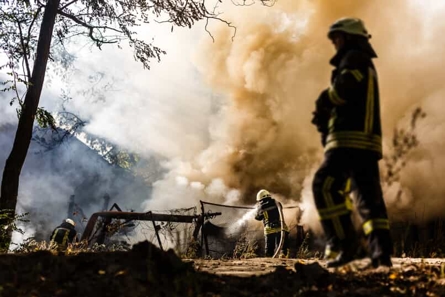Fire damage can be devastating for Wichita homeowners, especially during our dry seasons when fire risks increase. Understanding your insurance coverage is crucial for protecting your investment in our unpredictable Kansas climate.
With Wichita's mix of historic homes in College Hill and newer developments in East Wichita, knowing exactly what your insurance covers can make the difference between a smooth recovery and financial hardship after a fire.
What Does Standard Homeowners Insurance Cover After a Fire?
Most standard homeowners insurance policies in Kansas cover fire damage, but understanding the specifics of your coverage is essential. Insurance typically covers both structural damage and personal property losses, though coverage limits and terms can vary significantly.
The complexity of fire insurance claims in Wichita often depends on your home's location and construction type. Historic districts like Riverside and College Hill may have specific requirements that affect coverage and restoration.
Structural Coverage After a Fire
Your policy's dwelling coverage protects the physical structure of your Wichita home. This coverage becomes particularly important given our region's diverse architectural styles, from Tudor Revival homes in Riverside to modern constructions in East Wichita.
Essential structural elements covered typically include:
Beyond these basics, policies often cover smoke damage remediation and structural repairs needed to meet current Wichita building codes. This becomes especially important in older neighborhoods where outdated materials or construction methods must be updated during restoration.
Personal Property Coverage Explained
When it comes to personal belongings, insurance coverage can be complex. Most policies use actual cash value (ACV) or replacement cost value (RCV) to determine compensation. Understanding the difference is crucial for Wichita homeowners, especially those with valuable collections or antique furnishings.
Standard coverage typically includes:
However, coverage limits vary, and many Wichita residents find they need additional riders for high-value items. Consider documenting your belongings through photos and detailed inventories before any disaster strikes.
What Additional Living Expenses Are Covered After a Fire?
When a fire forces you from your home, insurance typically covers Additional Living Expenses (ALE). For Wichita residents, this coverage becomes vital during our peak storm seasons when repairs might take longer than expected.
Understanding your ALE coverage helps you make informed decisions during displacement. Most policies cover expenses that maintain your normal standard of living, though coverage duration and limits vary based on your policy.
Temporary Housing and Relocation Costs
Finding suitable temporary housing in Wichita requires understanding what your policy covers. Whether you're relocating to an apartment in Bradley Fair or a rental home in Crown Heights, your insurance should help maintain your lifestyle.
Typical relocation expenses include:
Hotel stays during immediate displacement
Rental home or apartment costs
Moving and storage expenses
Additional utilities or deposits
Pet boarding when necessary
Temporary furniture rental
Your policy should cover these costs until your home becomes habitable again, though this timeframe might extend during Wichita's severe weather seasons when construction delays are common.
Additional Daily Living Expenses
Beyond housing, fire displacement often increases your daily living costs. Insurance companies recognize these additional burdens and typically provide coverage for increased living expenses.
Your policy may cover excess costs for:
Restaurant meals when kitchen access is limited
Extra transportation expenses
Laundry services
School transportation changes
Work commute differences
Temporary childcare adjustments
Keep detailed records of these expenses, as your insurance company will need to verify that they exceed your normal living costs. Many Wichita families find their daily expenses increase significantly during displacement.
How Do You Document Fire Damage for Insurance?
Proper documentation strengthens your insurance claim and helps ensure fair compensation. In Wichita's variable climate, thorough documentation becomes especially important as weather conditions can worsen damage before adjusters arrive.
Creating a Comprehensive Damage Inventory
Begin documenting damage as soon as fire officials declare your home safe to enter. Wichita's restoration experts recommend starting with a systematic approach to ensure nothing gets overlooked.
Take detailed photos and videos of:
Don't dispose of any damaged items until your insurance adjuster approves. Keep all documentation organized by room or category to streamline the claims process.
Working with Insurance Adjusters
Insurance adjusters familiar with Wichita's building codes and construction costs will evaluate your damage. Understanding this process helps ensure a fair assessment of your losses.
During the adjustment process, be prepared to provide:
A detailed home inventory from before the fire
Documentation of valuable items
Recent home improvement records
Property maintenance history
Receipts for emergency repairs
Local contractor estimates
Meeting with adjusters promptly helps expedite your claim, especially important during Wichita's storm season when adjusters handle multiple claims.
What Additional Coverage Should You Consider?
Standard policies might not fully cover all fire-related losses. Given Wichita's unique challenges, from severe storms to aging infrastructure, considering additional coverage can provide crucial protection.
Code Upgrade Coverage
Many older Wichita homes, especially in historic districts like Delano and College Hill, require significant updates to meet current building codes after a fire. Code upgrade coverage helps protect against these additional costs.
This coverage becomes particularly important when dealing with:
Electrical system modernization
Plumbing upgrades
HVAC system replacement
Foundation reinforcement
Roofing material requirements
Energy efficiency standards
Need Help With Fire Damage Assessment? | Wichita, KS
Don't navigate fire damage restoration alone. ServiceMaster by Best understands Wichita's unique restoration challenges and works directly with insurance companies to ensure comprehensive coverage of your losses.
Contact ServiceMaster by Best today for expert guidance through your fire damage restoration and insurance claims process.


